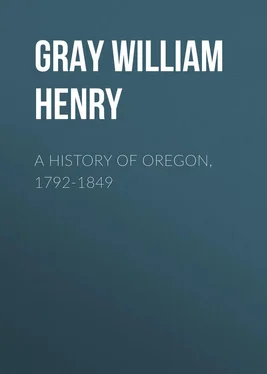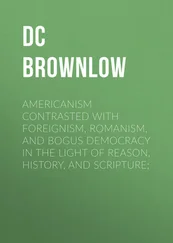William Gray - A History of Oregon, 1792-1849
Здесь есть возможность читать онлайн «William Gray - A History of Oregon, 1792-1849» — ознакомительный отрывок электронной книги совершенно бесплатно, а после прочтения отрывка купить полную версию. В некоторых случаях можно слушать аудио, скачать через торрент в формате fb2 и присутствует краткое содержание. Жанр: literature_19, foreign_antique, foreign_prose, Историческая проза, на английском языке. Описание произведения, (предисловие) а так же отзывы посетителей доступны на портале библиотеки ЛибКат.
- Название:A History of Oregon, 1792-1849
- Автор:
- Жанр:
- Год:неизвестен
- ISBN:нет данных
- Рейтинг книги:5 / 5. Голосов: 1
-
Избранное:Добавить в избранное
- Отзывы:
-
Ваша оценка:
- 100
- 1
- 2
- 3
- 4
- 5
A History of Oregon, 1792-1849: краткое содержание, описание и аннотация
Предлагаем к чтению аннотацию, описание, краткое содержание или предисловие (зависит от того, что написал сам автор книги «A History of Oregon, 1792-1849»). Если вы не нашли необходимую информацию о книге — напишите в комментариях, мы постараемся отыскать её.
A History of Oregon, 1792-1849 — читать онлайн ознакомительный отрывок
Ниже представлен текст книги, разбитый по страницам. Система сохранения места последней прочитанной страницы, позволяет с удобством читать онлайн бесплатно книгу «A History of Oregon, 1792-1849», без необходимости каждый раз заново искать на чём Вы остановились. Поставьте закладку, и сможете в любой момент перейти на страницу, на которой закончили чтение.
Интервал:
Закладка:
We have before us the original depositions in reference to the facts stated, and also the attempt to excuse the principal actors in that horrible transaction, as given by Brouillet in justification of the course pursued by the Jesuit missionaries.
We have also the superficial and bombastic report of J. Ross Browne, special agent of the Treasury Department, dated December 4, 1857, containing a copy of this Jesuit history of the murder of Dr. Whitman. In his remarks previous to giving Brouillet’s history, he says: “In view of the fact, however, that objections might be made to any testimony coming from the citizens of the Territories, and believing also that it is the duty of a public agent to present, as far as practicable, unprejudiced statements , I did not permit myself to be governed by any representations unsupported by reliable historical data.” – “The fact also is shown that, as far back as 1835, the Indians west of the Rocky Mountains protested against the taking away of their lands by the white race. That this was one of the alleged causes of the murder of Dr. Whitman and family.”
There are sixty-six pages in this report. Twelve of them are Mr. Browne’s, one page of official acknowledgment, and fifty-three from the parties implicated.
The statements of Mr. Browne, of Mr. Fitzgerald, and the oath of Mr. Douglas, are sufficient to show the ignorance, stupidity, and falsehood incorporated in his report, were there no other historical facts to convict him of ignorance in allowing such representations to be made in an official document. In the proper place we will bring this report into our history, with both sides of the question.
Were we to express an opinion of Mr. J. Ross Browne’s report, with our personal knowledge of what he pretends to relate, we would say he ignored the people, the country, and the government whose agent he claimed to be, and was reporting for the special benefit of the Roman religion and British government, as these are extensively quoted as historical data from which his report and conclusions are drawn.
The reader will understand our main object to be to give a full history of all influences and prominent transactions and events that have occurred in Oregon from 1792 to 1849.
To understand cause and effect, and the true history of the country, we have to examine the facts as connected with actions, and also to trace back the history of the actors, in order to see how far they may be made responsible for the result of their actions.
Oregon, from the time of its discovery, has been a field where all the influences of which we are writing have been living, active influences; and they are by no means inactive or dead at the present time. Some of them are more active now than they were in 1836.
A full knowledge of the past will enable us to guard the present and the future. Our English writer has gathered his facts and drawn his conclusions in London. We, upon this, our western coast, are witnesses of the cause and results of his conclusions, and any statement he makes we feel ourselves abundantly able to corroborate or correct.
As we proceed with our history we shall have frequent occasion to quote Mr. Fitzgerald, as the best English evidence, in favor of our American statements or positions. Since writing the above we have noticed a lengthy article in the Edinburgh Westminster Review for July, 1867, giving a concise history of the Hudson’s Bay Company, under the heading, “The Last Great Monopoly.” In that article the author has shown extensive historical knowledge of the operations and influences of that monopoly in that portion of our continent over which they have held exclusive control.
He regards them as a blight upon the country, and an “incubus” to be removed by national legislation. If our work had been published, we should conclude that he must have drawn many of his facts from our own observations. But this is not the case; hence the value to us of his corroboration of the facts we affirm from personal knowledge.
CHAPTER IV
Care of Great Britain for her fur companies. – Columbia Fur Company. – Astor’s second fur company. – Major Pilcher’s fur company. – Loss of the ship Isabel . – Captain Bonneville’s expedition. – Cause of his failure. – Captain Wyeth’s, 1832. – Indians ask for missionaries in 1833. – Methodist Mission. – Fort Hall established. – Fort Boise.
By reference to the act of the British Parliament of June 2, 1821, it will be seen that the affairs of the North American British Fur companies were in a fair way to defeat all British interests in America. To suppress these feuds among their own people became a matter of national importance and policy.
To accomplish so desirable an object, Parliament, in the act above referred to, extended the civil and criminal jurisdiction of Canada over all the territories of the Hudson’s Bay Company; in the thirteenth article of the act, and in the fourteenth, repealed all that was before taken away from that company, and confirmed absolutely all the rights supposed to have been given by the original charter, as follows: —
Section 14. “And be it further enacted, that nothing in this act contained shall be taken or construed to affect any right or privilege, authority or jurisdiction, which the governor and company of adventurers trading to Hudson’s Bay are by law entitled to claim and exercise under their charter; but that all such rights, privileges, authorities, and jurisdictions, shall remain in as full force, virtue, and effect, as if this act had never been made; any thing in this act to the contrary notwithstanding.”
This act, however just it may have been considered, certainly embodied a large amount of national prejudice against the people of French or Canadian birth, in exempting the territory of the Hudson’s Bay Company from its influence. It had a twofold effect: the one, to check feuds among British subjects; the other, to unite them in one vast Indian monopoly, – to license this united company to go forward with their Indian political arrangements unmolested, – to punish and dispose of all intruders upon their supposed, or asserted rights, as they might deem for the interest of their trade, which, according to the charter of Charles II., bearing date May 2, 1670, they were “at all times hereafter to be personable and capable in law, to have, purchase, receive, possess, enjoy, and retain lands, rents, privileges, liberties, jurisdiction, franchises, and hereditaments of what kind, nature, or quality soever they be, to them and their successors.”
The whole trade, fisheries, navigation, minerals, etc., of the countries, are granted to the company exclusively; all other of the king’s subjects being forbidden to visit , hunt , frequent , trade , traffic , or adventure therein, under heavy penalties; and the company is moreover empowered to send ships , and to build fortifications for the defense of its possessions, as well as to make war or peace with all nations or peoples not Christian, inhabiting those territories, which are declared to be hence-forth reckoned and reputed as one of his Majesty’s plantations or colonies in America, called Rupert’s Land.
It will be remembered that as early as 1818, a question arose between the United States and Great Britain, as to which was the rightful owner of the Oregon country. The Northwest Fur Company were the only subjects of Great Britain that had competed with the American fur companies in the discovery or trade of the country. To ignore that company altogether would weaken the British claim to Oregon by right of prior discovery and occupancy. Hence, by uniting the two companies under an ancient English charter, combining their united capital and numerical strength, discarding all doubtful subjects, and confirming the absolute power of their own British company, they could easily secure Oregon as British territory. The wisdom and effect of this policy will be developed as we proceed.
Читать дальшеИнтервал:
Закладка:
Похожие книги на «A History of Oregon, 1792-1849»
Представляем Вашему вниманию похожие книги на «A History of Oregon, 1792-1849» списком для выбора. Мы отобрали схожую по названию и смыслу литературу в надежде предоставить читателям больше вариантов отыскать новые, интересные, ещё непрочитанные произведения.
Обсуждение, отзывы о книге «A History of Oregon, 1792-1849» и просто собственные мнения читателей. Оставьте ваши комментарии, напишите, что Вы думаете о произведении, его смысле или главных героях. Укажите что конкретно понравилось, а что нет, и почему Вы так считаете.












